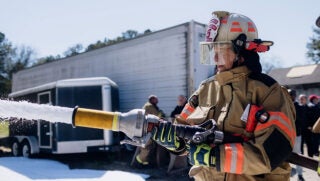A controversial bill aiming to end horse slaughter for human consumption has made its way out of committee and to the Colorado state senate and will be up for debate today.
The bill, SB23-038, also known as the Prohibit Equine Slaughter for Human Consumption Bill, was introduced in January and sets out to keep horses out of slaughterhouses, making it illegal for people to sell horses at auction for slaughter.
Last week, the bill barely made its way past the first test in committee at the state Capitol after being stripped down into a livestock transportation bill. The amended measure is now in front of the full Senate.
“In my experience, and I’ve been around horses my entire life, this is a last resort. What nobody ever talks about is the welfare of the owners,” said Scott Dorencamp with the Professional Rodeo Cowboys Association.
The original bill made it a crime to slaughter horses and burros for human consumption, and came with a hefty (and somewhat unclear list of punishments). The amended bill still reads on the state’s site that any equine that is unlawfully slaughtered and each 100 pounds of equine meat derived from unlawful slaughter would be a separate offense.
While the first offense would be a class 1 misdemeanor, the mandatory fine would still be $1,000 (we aren’t sure if that’s for each 100 pounds of meat, or not). And, any subsequent slaughter would be a class 5 felony with a minimum fine of $5,000. If fraud is involved, that person will be charged with a class 4 felony and a minimum fine of $10,000. The person involved will be forever prohibited from owning, possessing, or caring for an equine, and from participating in a public livestock market for up to five years.
What passed through the Capitol last week appears to be a watered-down version that establishes tighter regulations when transporting 20 or more horses to slaughter. While there are no horse slaughter facilities currently open in the U.S., horses are sent to Mexico and Canada for processing. But, livestock transportation is already governed by federal laws.
Dan Waldvogle, the director of the Rocky Mountain Farmers Union, told the Colorado Sun that, “We are scratching our heads as to the need behind this legislation. Our member-led policy supports the sale and consumption of horse meat that meets the same health and safety standards already in place for other livestock meats,” he said. “Numerous cultures embrace horse consumption and we support their access to culturally relevant products and increasing their food sovereignty.”
Ag Chair Sen. Dylan Roberts also voiced his concern about the measure, saying that it is not enforceable as it attempts to regulate and police behavior outside of Colorado. California’s now-infamous Proposition 12 measure similarly appears to have an impact on how other states raise and harvest livestock, and it has been bogged down for years in multiple lawsuits and is currently being considered by the U.S. Supreme Court.
According to the American Journal of Veterinary Research, over 20,000 horses are transported to slaughter each year outside of the United States. And while animal welfare groups and some horse lovers vie against the practice, states such as Wyoming are introducing resolutions to Congress to change federal laws allowing the slaughter of wild horses.


